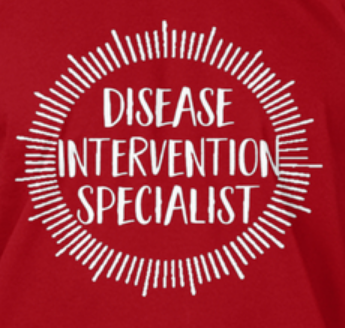The Essential Role of DIS: A DIS Recognition Day Blog
DIS Recognition is October 5. How are you celebrating this week?

Help us Celebrate #DISday2018
It’s that time of year to recognize the heroic work of Disease Intervention Specialists around the nation. Click here and find out how you can recognize these public health heroes on DIS Recognition Day 2018 taking place on Friday, October 5.
Why is DIS Recognition Day important?
Disease intervention specialists can sometimes feel like we’re working in a vacuum. Because of the confidential nature of our work, our role in prevention and care for sexually transmitted infections and HIV (as well as other diseases) is often poorly understood or even unacknowledged. I always say “you don’t know you need us…until you need us.” Recognition of DIS is important because the people who do this work deserve to be seen and spoken of as committed, skilled, knowledgeable professionals and the critical part of our public health system that they are. It also helps people across the spectrum take note of the value DIS bring to the nation’s healthcare system and to communities everywhere.
What role do DIS play in STD prevention?
DIS are part of the backbone of STD and HIV prevention in this country.
Zandt BryanIt’s a multidimensional role that is part detective, part educator (both for members of the public and medical providers), and part counselor. Your best DIS can talk to anyone, anywhere, about anything. That’s what DIS do – by phone, online, and out across communities. In doing so, DIS ensure that people who are diagnosed with sexually transmitted diseases receive correct medical care and understand what this means for their health. They also ensure that those who are at risk of sexually transmitted diseases understand their risk and are empowered to not only know their HIV and STD status, but to prevent themselves and others from being infected or affected. In giving people the opportunity to learn, think, and talk about how STDs and HIV affect themselves and others, DIS also can help reduce stigma around these infections, and help people who are infected or at risk to learn to navigate the healthcare system and their own cultural attitudes around sex in order to take charge of their sexual health.
How do you see the role of DIS changing as we continue to rises in STD rates?
I do and don’t see the role of DIS changing. I believe there is room for DIS to go beyond traditional disease intervention activities once we have fully resourced and supported their core purpose. What DIS bring to communities and individuals continues to be a crucial part of reducing the spread of sexually transmitted diseases and HIV. The way that DIS blend epidemiology and culture to ensure that people at risk of infection are aware of their risk and empowered to take charge of their sexual health is still an extremely valuable service. The skills and abilities that make DIS so valuable can be broadly applied to many other prevention and medical care activities – for example, PrEP navigation and reproductive health, among many others. I believe that people who build skills and experience as DIS are excellent candidates to provide culturally appropriate services to the public in service areas like these. At the same time, we must first fully resource the original core intervention which DIS provide in order for it to be fully effective and supportive of the additional important services that interlink with sexual health.
About Zandt
Zandt Bryan has been a DIS for 14 years and is currently the HIV/STD Field Services Coordinator for the Washington State Department of Health.
For questions about DIS and #DISDay2018, email Leandra Lacy, Manager, Capacity Building